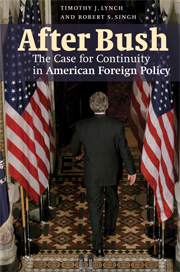Book contents
- Frontmatter
- Contents
- List of figures
- Acknowledgements
- Introduction: Winning the Second Cold War
- Chapter 1 Bush and the American foreign policy tradition
- Chapter 2 The constitution of American national security
- Chapter 3 The Second Cold War on Islamist terror: negative audits
- Chapter 4 The Second Cold War on Islamist terror: a positive audit
- Chapter 5 Iraq: Vietnam in the sand?
- Chapter 6 The Middle East: reformation or Armageddon
- Chapter 7 Frineds and foes after Bush
- Chapter 8 The emerging consensus at home and aborad
- Conclusion: The case for contiuity
- Notes
- Bibliography
- Index
Chapter 5 - Iraq: Vietnam in the sand?
Published online by Cambridge University Press: 22 September 2009
- Frontmatter
- Contents
- List of figures
- Acknowledgements
- Introduction: Winning the Second Cold War
- Chapter 1 Bush and the American foreign policy tradition
- Chapter 2 The constitution of American national security
- Chapter 3 The Second Cold War on Islamist terror: negative audits
- Chapter 4 The Second Cold War on Islamist terror: a positive audit
- Chapter 5 Iraq: Vietnam in the sand?
- Chapter 6 The Middle East: reformation or Armageddon
- Chapter 7 Frineds and foes after Bush
- Chapter 8 The emerging consensus at home and aborad
- Conclusion: The case for contiuity
- Notes
- Bibliography
- Index
Summary
As was often the case, Mr. Reagan did not seem to be paying close attention, according to one of those present. But when the briefing was over he had one question. He wanted to hear again the number of troops the planners were going to send in. He was told a figure and shook his head. ‘Make it twice that,’ he told a slightly puzzled general. Asked why, the President said calmly: ‘If Jimmy Carter had sent 16 helicopters rather than eight to Desert One to rescue the US hostages in Iran in 1980, you'd be sitting here briefing him today, not me.’
Gerard BarkerI cannot, alas, leave in such a cowardly fashion. As for you, and in particular for your great country, I never believed for a moment that you would have this sentiment of abandoning a people which has chosen liberty … I have only committed this mistake of believing in you.
Cambodian Prime Minister Sirik Matak, April 1975, on the offer of asylum by the US ambassador after US withdrawal from Indochina; Matak was killed by the Khmer Rouge a month laterThose who wallow in … Vietnam angst would have us be not only reticent to help the rest of the world but ashamed of our ability to do so and doubtful of the value of spreading democracy and of the superiority of freedom itself.
Melvin Laird, US Secretary of Defense, 1969–73- Type
- Chapter
- Information
- After BushThe Case for Continuity in American Foreign Policy, pp. 147 - 188Publisher: Cambridge University PressPrint publication year: 2008



